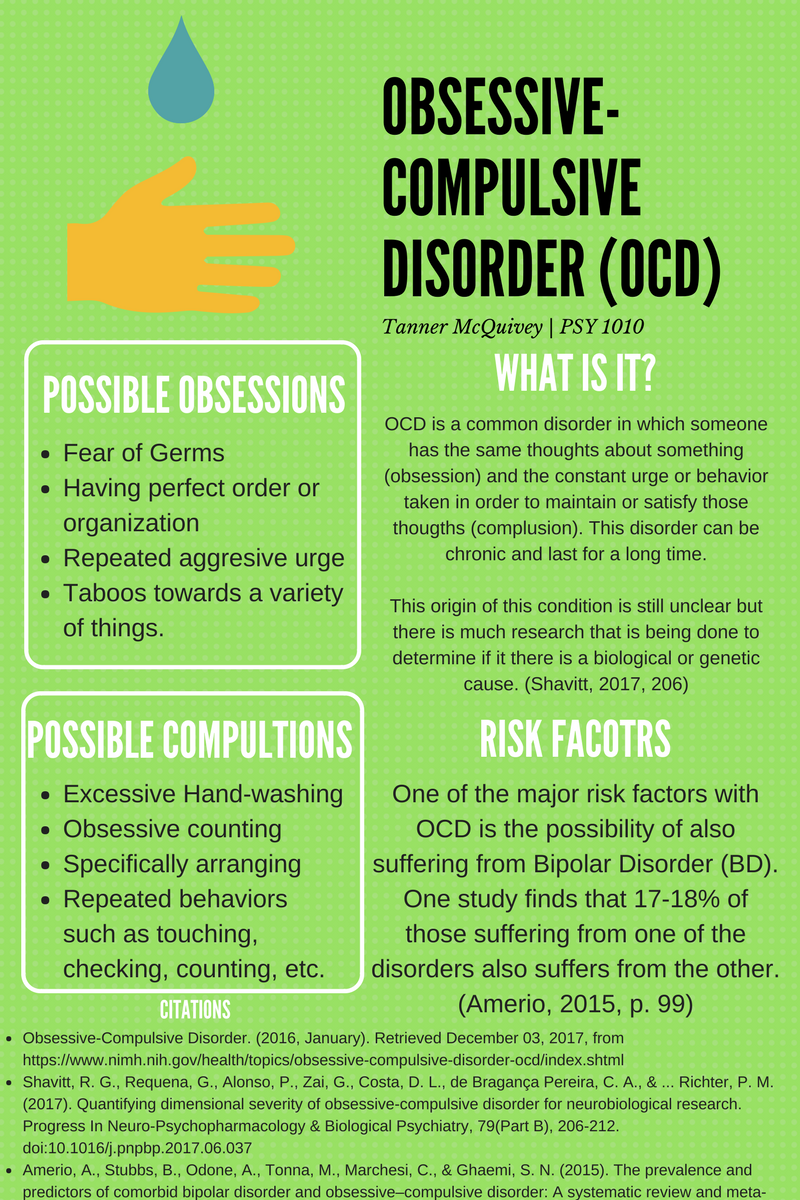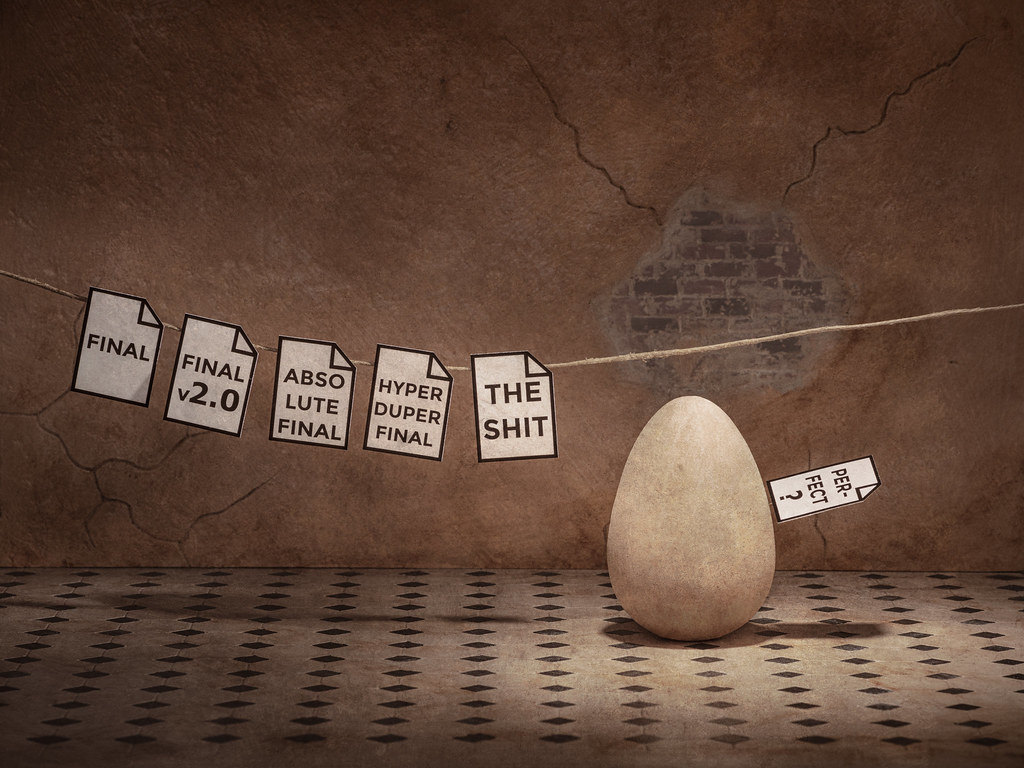Difference Between OCD and Perfectionism
Obsessive Compulsive Disorder (OCD) and perfectionism are often associated with each other as they both involve organization and orderliness. Perfectionism has two main types: maladaptive perfectionism and adaptive perfectionism (Kelly, 2019); the former is linked with OCD since it is characterized by distress, excessive preoccupation with control, symptoms of mental illness, etc. For instance, an individual with maladaptive perfectionism is experiencing emotional distress since he cannot control the behavior of his colleagues. In a similar way, a person with OCD may be going through anxiety because he cannot control the situation in which he is in; like when he needs to hold the door knob so he can get out of a cab but he is terribly worried that it has germs.
Also, both OCD and perfectionism are related with checking behaviors. For instance, a maladaptive perfectionist would like to check things over and over again to make sure that everything is acceptable according to his standards. Similarly, one of the symptoms of OCD is having repetitive behaviors such as checking. For example, an individual with OCD may repeatedly check if the lights or kitchen appliances are turned off.
In psychology, perfectionism is a trait characterized by setting high goals, being highly critical, being pushed toward their goals by fear, focusing on results, having low self-esteem, defensiveness, being depressed by unmet goals, and fear of failure (Scott, 2020). In comparison, the fifth edition of the Diagnostic and Statistical Manual of Mental Disorders (DSM-5) specifies OCD as having obsessions (e.g., recurrent and persistent thoughts or impulses), compulsions (e.g., repetitive behaviors), or both which are time-consuming and are not due to a medical condition or the effects of a substance (American Psychiatric Association, 2013). The following discussions further delve into the differences between perfectionism and OCD.

What is OCD?
OCD is a mental disorder characterized by obsessions and/or compulsions which are time-consuming (e.g., longer than one hour in a day). Specifically, obsessions are frequent, persistent, and intrusive impulses, urges, or thoughts which usually cause distress. Such obsessions may then be attempted to be ignored or suppressed by performing a compulsion. These compulsions are repetitive behaviors like checking and ordering or mental acts such as counting or silently saying a certain phrase for hours. It may also be specified if the individual with OCD has fair, poor, or absent insight regarding his condition, and if his symptoms are tic-related (American Psychiatric Association, 2013). According to Smith, Robinson, and Segal (2019), most people with OCD fall into one of the following groups: washers (e.g., handwashing or cleaning), checkers (e.g., if doors are locked), doubters and sinners (something awful might happen or they might get punished if things are not perfect), counters and arrangers (preoccupied with symmetry and order), and hoarders (e.g. fearing that something unpleasant may take place if they throw something away).
One patient story features Allen who was diagnosed with OCD as evidenced by his fear of contracting HIV, intrusive thought of hitting someone, and his obsession with the exactness in the level of water. His compulsions included excessive hand washing, repeated clarifications of what he said, and mentally replaying conversations. Allen spent many hours on his OCD routines which got in the way of his normal daily tasks (American Psychiatric Association, 2020).

What is Perfectionism?
There are two kinds of perfectionism: adaptive/healthy perfectionism and maladaptive/ unhealthy perfectionism. The former is characterized by conscientiousness, being goal-directed, having effective organization, having high standards, and persistence. On the other hand, the latter involves having too high expectations of others, being doubtful of one’s performance, extreme preoccupation regarding control and past mistakes, and fear of committing mistakes (Kelly, 2019).
In addition, Scott (2020) describes perfectionism as a trait characterized by setting high goals, being highly critical, pushed toward their goals by fear, focused on results, low self-esteem, and defensiveness, depressed by unmet goals, and fear of failure. For instance, a perfectionist would view an “almost 100%” performance as a failure; he may also review his past performances and excessively focus on his weaknesses; and his motivation to work hard is his fear that he would not reach his high standard. In addition, he may procrastinate since he is too worried that he might fail; and due to his being too self-critical, he has a very poor self-esteem.
Difference between OCD and Perfectionism
Nature
Perfectionism is defined as a psychological trait or a theological doctrine. On the other hand, OCD is classified as a mental disorder.
Definition
In psychology, perfectionism is a trait characterized by setting high goals, being highly critical, pushed toward their goals by fear, focused on results, low self-esteem, and defensiveness, depressed by unmet goals, and fear of failure (Scott, 2020). It is also defined as a disposition to view imperfections as unacceptable (Merriam-Webster, 2020). In theology, it is a doctrine that people can attain freedom from sin (Merriam-Webster, 2020). In comparison, the DSM-5 specifies OCD as having obsessions, compulsions, or both which are time-consuming and are not due to a medical condition or the effects of a substance (American Psychiatric Association, 2013).
Types
There are two kinds of perfectionism: adaptive/healthy perfectionism and maladaptive/ unhealthy perfectionism (Kelly, 2019). As for OCD, most people with this condition are categorized as washers, checkers, doubters and sinners, counters and arrangers, and hoarders (Smith, Robinson, & Segal, 2019).
Seriousness
Perfectionism is less serious since the adaptive/healthy type is associated with good psychological well-being. On the other hand, OCD is a mental disorder; hence, some may describe it as an extreme form of perfectionism as this diagnosis is met if the individual’s symptoms intervene with his daily functioning.
Perfectionism vs OCD

Summary
- OCD and perfectionism are often associated with each other as they both involve organization, checking behaviors, and orderliness.
- Perfectionism is defined as a psychological trait or a theological doctrine while OCD is a mental disorder.
- Generally, perfectionism (which can be adaptive) is less serious than OCD.
- Difference Between Hematoma and Melanoma - February 9, 2023
- Difference Between Bruising and Necrosis - February 8, 2023
- Difference Between Brain Hematoma and Brain Hemorrhage - February 8, 2023
Search DifferenceBetween.net :
Leave a Response
References :
[0]American Psychiatric Association. Diagnostic and statistical manual of mental disorders: DSM-5. Washington, DC: American Psychiatric Publishing, 2013. Print.
[1]American Psychiatric Association. Patient Story: OCD. 2020. https://www.psychiatry.org/patients-families/ocd/patient-story
[2]Kelly, Owen. “Obsessive Compulsive Disorder (OCD) and Perfectionism”. verywell Mind. 2019. https://www.verywellmind.com/ocd-and-perfectionism-2510483
[3]Scott, Elizabeth. “Perfectionist Traits: Do These Sound Familiar?”. verywell Mind. 2020. https://www.verywellmind.com/signs-you-may-be-a-perfectionist-3145233
[4]Smith, Melinda, Robinson, Lawrence, and Segal, Jeann. Obsessive-Compulsive Disorder (OCD). HelpGuide. 2019. https://www.helpguide.org/articles/anxiety/obssessive-compulsive-disorder-ocd.htm
[5]Image credit: https://live.staticflickr.com/65535/49141784493_199d15b2f6_b.jpg
[6]Image credit: https://upload.wikimedia.org/wikipedia/commons/0/0d/Obsessive-Compulsive_Disorder.png
